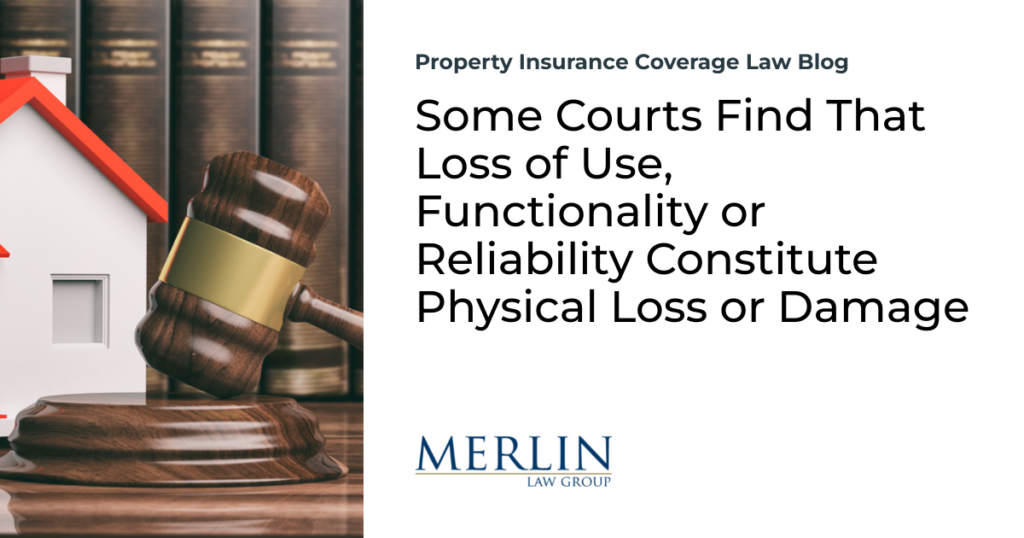Some Courts Find That Loss of Use, Functionality or Reliability Constitute Physical Loss or Damage

Yesterday’s post, Mere Possibility of Physical Damage Is Not Enough To Trigger Coverage, stated that “direct expert testimony is often required to prove the existence of physical damage to the insured property. Courts will normally require more than a mere possibility of damage.” The operative word is “normally” because there are exceptions.
This post is not trying to rehash the debate about whether Covid constitutes physical loss or damage. Instead, there are cases not involving Covid where courts have found that the loss of use, functionality, or reliability constitutes physical loss or damage.
A law review article published by the American Bar Association last year, What Constitutes Physical Loss or Damage In a Property Insurance Policy?,1 noted the following:
But some courts have determined that the loss of use, functionality, or reliability of electronic equipment constitutes physical loss or damage. Wakefern v. Liberty Mutual Fire Insurance Co. is one example. There, Wakefern’s supermarkets suffered food spoilage and business income losses during the August 2003 blackout, which occurred after the proper operation of protective relay devices caused the de-energizing of transmission lines. After finding the undefined term ‘physical damage’ to be ambiguous, the New Jersey appellate court held that ‘the electrical grid was ‘physically damaged’ because, due to a physical incident or series of incidents, the grid and its component generators and transmission lines were physically incapable of performing their essential function of providing electricity.’
A similar result can be seen in Stack Metallurgical Services Inc. v. Travelers Indemnity Co. of Connecticut. There, the insured’s furnace used to heat treated medical devices could no longer be used for that purpose after the furnace became contaminated with lead particles from a disintegrating lead hammer that was left behind in the furnace. In ruling that the insured established the requisite physical loss or damage for its business income claim, an Oregon federal court concluded that ‘the physical change in the furnace from a release of lead particles, which prevented the furnace from being used for its ordinary expected purpose, is fairly characterized as a ‘direct physical loss of or damage to’ the furnace.’
Finally, the court in Ashland Hospital Corp. v. Affiliated FM Insurance Co. determined that the ‘loss of reliability’ of electronic equipment constituted physical loss or damage. In Ashland, a hospital’s computer equipment used to store medical records was subjected to elevated temperatures when the air conditioning equipment failed. Thereafter, the equipment manufacturer recommended replacement because it could ‘no longer confirm the long term reliability’ of the exposed equipment. In finding coverage, the Kentucky federal court decided that the ‘core function and value’ of the equipment was to provide the insured hospital with ‘99.999% guaranteed reliability of critical data’ and the equipment’s ‘value–its insurable risk–is its reliability.’
As these cases illustrate, courts have taken two distinct approaches in claims involving the loss of functionality of electronic equipment. Some courts have relied on the traditional definition of ‘physical’ in finding that physical loss or damage requires a distinct, demonstrable physical alteration of the equipment. But other courts have given ‘physical’ a broader interpretation in finding that the loss of use, functionality, or reliability constitutes physical loss or damage.
The point is that policyholders should endeavor to show that an alteration in the physical state of property occurred and strongly consider using expert testimony to prove this occurred. This is because courts and insurance companies will usually require this degree of proof to satisfy the physical damage requirement in property insurance policies.
However, there is a line of decisions that may help in unique cases where something less than that proof may be all that is required. In those cases, policyholders and public adjusters should seek legal counsel to develop a legal theory of loss that provides coverage.
Thought For The Day
The young man knows the rules, but the old man knows the exceptions.
—Oliver Wendell Holmes, Sr.
1 Scott G. Johnson, What Constitutes Physical Loss or Damage In a Property Insurance Policy?, 54 Tort Trial & Ins. Prac. L.J. 95, Winter 2019.







